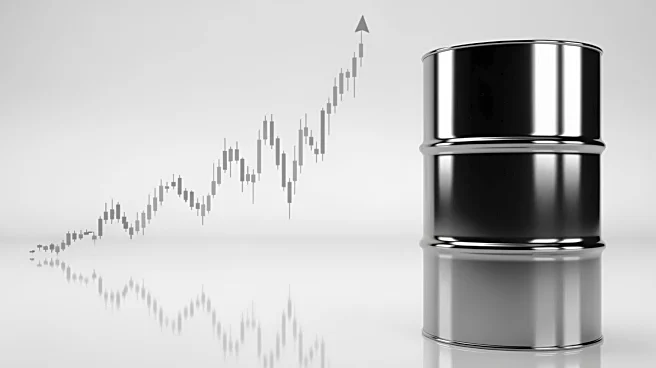What's Happening?
On October 23, 2025, Wall Street experienced a significant rise as oil prices surged following President Trump's announcement of new sanctions on Russia's crude industry. The Dow Jones Industrial Average
increased by 144 points, closing just below its record high, while the S&P 500 and Nasdaq Composite also saw gains of 0.6% and 0.9%, respectively. The sanctions target Russian oil giants Rosneft and Lukoil, aiming to pressure Russia to end its conflict with Ukraine. This move led to a 5.5% increase in crude oil prices, benefiting companies in the oil and gas sector, such as Exxon Mobil and ConocoPhillips. Additionally, strong earnings reports from major U.S. companies like Dow and Las Vegas Sands contributed to the market's upward momentum.
Why It's Important?
The rise in oil prices and stock market gains highlight the interconnectedness of geopolitical events and economic markets. The sanctions on Russia could potentially constrict global oil supply, impacting energy prices and economic stability. U.S. companies in the oil sector stand to benefit from higher oil prices, while consumers may face increased costs. The stock market's positive response to strong corporate earnings suggests investor confidence in the resilience of U.S. businesses despite geopolitical tensions. However, the broader economic implications, including potential inflationary pressures from rising oil prices, remain a concern for policymakers and consumers alike.
What's Next?
The market will closely monitor the impact of the sanctions on global oil supply and prices. Investors and analysts will also watch for further developments in the Russia-Ukraine conflict and any additional economic measures from the U.S. government. The Federal Reserve's upcoming decisions on interest rates, influenced by inflation data and economic conditions, will be critical in shaping future market trends. Companies will continue to report earnings, providing further insights into the health of the U.S. economy and potential market directions.
Beyond the Headlines
The sanctions on Russia underscore the complex interplay between international politics and economic policy. The move reflects the U.S. government's strategic use of economic tools to influence geopolitical outcomes. This situation also raises ethical considerations regarding the use of sanctions and their impact on global markets and populations. The long-term effects on U.S.-Russia relations and the global energy landscape could lead to shifts in international alliances and economic strategies.










